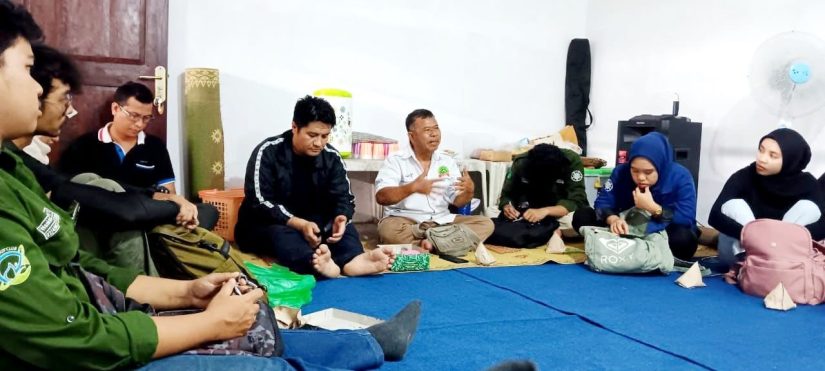
The Gadjah Mada University Postgraduate School (SPs) Environmental Science Masters and Doctoral Study Program again held Community Service (PkM) activities with the topic “Trash: Characteristics, Management, Problems and Impacts” which was held on Saturday, June 15 2024 at the Tourism Village Bromonilan, Purwomartani, Kalasan, Sleman, DIY. This activity was initiated by the SPs UGM lecturer team. The activity began with an opening and remarks from representatives of the lecturer team, namely Ir. Agus Prasetya, Ph.D. by conveying the objectives of implementing PkM activities in the form of Ecoliteracy Classes which have been routinely carried out as a forum for knowledge transfer between academics and the community.
The activity then continued with the main event delivering material and discussions regarding waste by Mr. Ir. Agus Prasetya, M.Eng.Sc., Ph.D and Mr. Prof. Chandra Wahyu Purnomo, ST., ME., M.Eng., D.Eng., and Mr. Dr.rer.nat. Rio Aryapratama, S.T., M.Sc. as moderator. The first presentation of the material was by Ir. Agus Prasetya, M.Eng.Sc., Ph.D with the material title “How should waste be treated?”. The first material focuses on studying waste problems from the perspective of community behavior or socio-cultural aspects.
In the first session, the resource person said that the waste problem needs immediate attention and handling because it can have a negative impact on various aspects of people’s lives. The waste problem also involves 3 (three) main aspects, namely physical, biological and socio-cultural. One alternative to solving this problem is from a socio-cultural perspective by building public awareness regarding the urgency of waste management.
Waste management begins with the awareness that the sources of waste production are resources that cannot be used or exploited by humans. Waste can be defined simply as the unwanted remains of human activities. Thus, humans are the main waste producers and the cause of waste problems.
Reducing the waste produced is one way to reduce the waste problem. Humans have full responsibility for the waste produced so that every action they take has consequences. Reducing waste can be done by implementing a new paradigm, namely a circular pattern. The circular pattern is a cycle of recycling waste into something else, thereby reducing the remaining waste or final residue. The circular pattern replaces the linear pattern of waste handling, and supports sustainability. The community can implement circular patterns as early as possible, both personally and in groups, with the help of education and government regulations regarding waste.
The first session was then continued with the delivery of the second material by Prof. Chandra Wahyu Purnomo, ST., ME., M.Eng., D.Eng. The second material with the title “Waste Management” shows the condition of waste management in Indonesia which is examined from a technical and government regulatory perspective. In general, waste management in Indonesia is still lagging behind compared to other countries. One of these facts is indicated by the low level of government commitment, both at the district/city, provincial and national levels. An example is the limited waste management budget in the regions, while the ideal target for waste management is 70% by the government and 30% by the community.
Currently, there are several factors that the government does not pay enough attention to, including the balance of waste generation, waste processing facilities, and the selection of appropriate technology. Waste management requires systematic planning starting from the source of the waste to the final disposal site. So, apart from building public awareness and participation in managing waste, the government also needs to make improvements both in terms of regulatory and technical aspects of the field.
The presentation of the material ended with a discussion between the resource person and the activity participants. Ecoliteracy Class activities are expected to be carried out in a sustainable manner with various topics needed by the community. This activity is in line with the sustainable development goals (Sustainable Development Goals) pillar 4 regarding the quality of education and pillar 15 regarding protecting terrestrial ecosystems
Tags: waste, environmental management, SDGs, SDG 4: quality of education, SDG 15: protect terrestrial ecosystems
Author: Siti Muyasaroh
